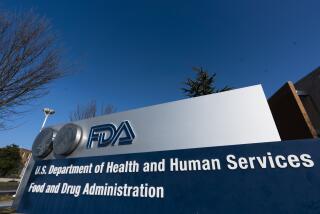Test may let breast cancer patients avoid chemo
- Share via
SAN ANTONIO — A genetic test can help doctors determine which breast cancer patients are likely to benefit from chemotherapy, even for those whose tumors are more advanced, researchers reported Thursday.
The finding needs to be confirmed in clinical trials, but experts said the test could already be used to spare some women from the debilitating side effects of cancer drugs.
The research study, among others being presented at the 30th annual San Antonio Breast Cancer Symposium, is part of a trend away from one-size-fits-all medicine.
“Each year we get a little closer” to individualized treatment of breast cancer, said Dr. Eric Winer of Harvard Medical School. “A few years ago, the vast majority of patients got chemotherapy. Now, more and more are asking whether it’s really appropriate.”
Breast cancer patients typically are treated with surgery, drugs and radiation, and those in whom the disease is more advanced almost always receive chemotherapy. Scientists have known for years that most patients don’t benefit from the harsh drugs, but they can’t predict who will respond.
Dr. Kathy Albain of Loyola University Medical Center in Illinois presented the findings of a retrospective study in which breast cancer patients were randomly assigned tamoxifen, a drug that blocks the action of estrogen on breast cells, or tamoxifen plus a standard chemotherapy regimen. All the patients in the study were “node-positive,” meaning the cancer had spread to their lymph nodes.
A 21-gene test called Oncotype DX was run on paraffin-embedded tumor samples from the patients that had been stored in tissue banks, and the researchers obtained “recurrence scores” for 148 women who had taken only tamoxifen and for 219 who had received chemotherapy as well.
They discovered that patients who scored at the low end of the test range got virtually no benefit from chemotherapy: Ten years after their diagnosis, they were about as likely to suffer a relapse or die as those who had skipped chemotherapy. On the other hand, women with high scores did significantly better on chemotherapy than on tamoxifen alone. And the results held true no matter how old the patients were.
This study “increases our confidence in determining who should avoid chemotherapy despite having positive nodes, and who should get it despite older age,” Albain said.
About 180,000 women a year are diagnosed with breast cancer in the U.S., and three-quarters of them have tumors that are fueled by estrogen. In approximately one-third of breast cancer cases, the tumors have spread to the lymph nodes at the time of diagnosis. That means some 45,000 women a year could potentially benefit from Albain’s research.
However, Albain noted that even among patients considered at low risk, 40 percent relapsed or died within 10 years.
“We need to learn how to better treat those patients,” said Albain. “Maybe it’s giving them chemo in a different way. But we know the standard chemotherapy isn’t helping.”
More than 8,500 breast cancer experts from 83 countries are attending the four-day meeting, which concludes Sunday.






